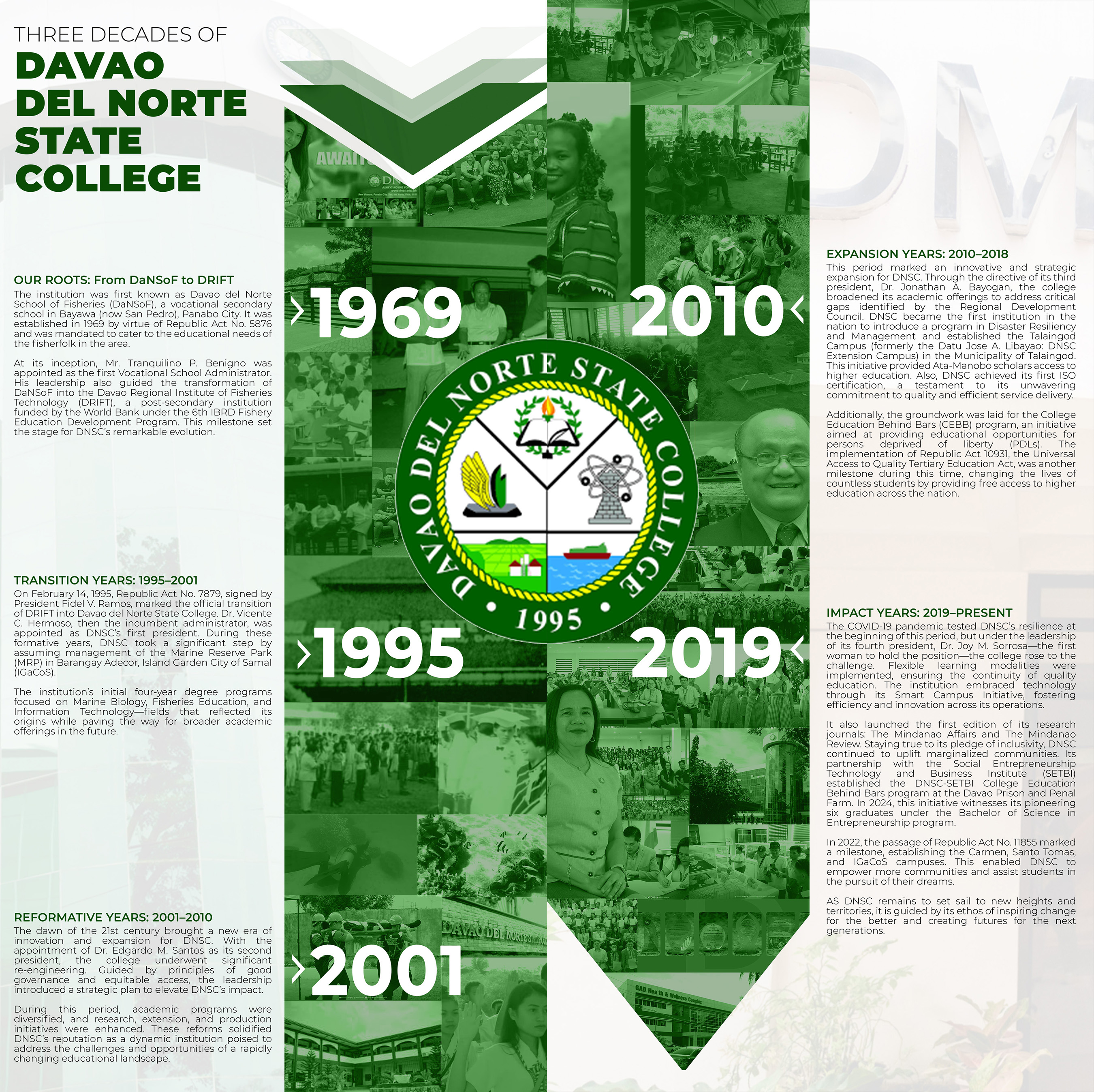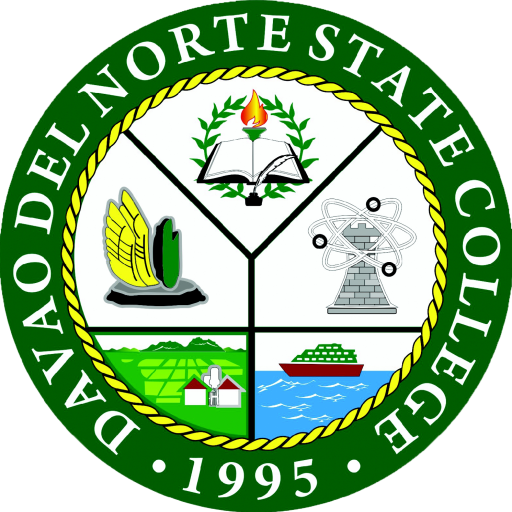OUR ROOTS: From DaNSoF to DRIFT
The story of Davao del Norte State College (DNSC) is one of resilience and enduring commitment to growth. The institution was first known as Davao del Norte School of Fisheries (DaNSoF), a vocational secondary school in Bayawa (now San Pedro), Panabo City. It was established in 1969 by virtue of Republic Act No. 5876 and was mandated to cater to the educational needs of the fisherfolk in the area. Over time, the school grew into a trusted state tertiary institution, celebrated for its excellence in education and service to the province of Davao del Norte and beyond.
At its inception, Mr. Tranquilino P. Benigno was appointed as the first Vocational School Administrator. His leadership also guided the transformation of DaNSoF into the Davao Regional Institute of Fisheries Technology (DRIFT), a post-secondary institution funded by the World Bank under the 6th IBRD Fishery Education Development Program. This milestone set the stage for DNSC’s remarkable evolution.
TRANSITION YEARS: 1995–2001
On February 14, 1995, Republic Act No. 7879, signed by President Fidel V. Ramos, marked the official transition of DRIFT into Davao del Norte State College.
Dr. Vicente C. Hermoso, then the incumbent administrator, was appointed as DNSC’s first president. During these formative years, DNSC took a significant step by assuming management of the Marine Reserve Park (MRP) in Barangay Adecor, Island Garden City of Samal (IGaCoS). Under the college’s stewardship, the MRP flourished into a sustainable eco-tourism destination, fostering marine conservation, generating local employment, and boosting tourism in the island-city.
The institution’s initial four-year degree programs focused on Marine Biology, Fisheries Education, and Information Technology—fields that reflected its origins while paving the way for broader academic offerings in the future.
REFORMATIVE YEARS: 2001–2010
The dawn of the 21st century brought a new era of innovation and expansion for DNSC. With the appointment of Dr. Edgardo M. Santos as its second president, the college underwent significant re-engineering. Guided by principles of good governance and equitable access, the leadership introduced a strategic plan to elevate DNSC’s impact.
During this period, academic programs were diversified, and research, extension, and production initiatives were enhanced. These reforms solidified DNSC’s reputation as a dynamic institution poised to address the challenges and opportunities of a rapidly changing educational landscape.
EXPANSION YEARS: 2010–2018
This period marked an innovative and strategic expansion for DNSC. The college broadened its academic offerings to address critical gaps identified by the Regional Development Council. DNSC became the first institution in the nation to introduce a program in Disaster Resiliency and Management, aligning with the national call for enhanced disaster preparedness and mitigation efforts.
Further extending its reach, DNSC established the Talaingod Campus (formerly the Datu Jose A. Libayao: DNSC Extension Campus) in the Municipality of Talaingod. This initiative provided Ata-Manobo scholars access to higher education through the Bachelor in Agricultural Technology program, later replaced with the Bachelor of Science in Agroforestry.
The college also introduced a specialized curriculum for the Davao del Norte Learning Institute, enabling government employees in the province to complete their Bachelor’s degrees and advance their careers. DNSC achieved its first ISO certification, a testament to its unwavering commitment to quality and efficient service delivery.
Additionally, the groundwork was laid for the College Education Behind Bars (CEBB) program, an initiative aimed at providing educational opportunities for persons deprived of liberty (PDLs). The implementation of Republic Act 10931, the Universal Access to Quality Tertiary Education Act, was another milestone during this time, changing the lives of countless students by providing free access to higher education across the nation.
IMPACT YEARS: 2019–PRESENT
The COVID-19 pandemic tested DNSC’s resilience at the beginning of this period, but under the leadership of its third president, Dr. Joy M. Sorrosa—the first woman to hold the position—the college rose to the challenge. Flexible learning modalities were implemented, ensuring the continuity of quality education. The institution embraced technology through its Smart Campus Initiative, fostering efficiency and innovation across its operations.
Dr. Sorrosa strengthened local and international partnerships, reflected in the college’s revised vision of becoming a premier higher education institution in Agri-Fisheries and Socio-Cultural Development in the ASEAN region. DNSC hosted a conglomeration of renowned scholars and aspiring researchers nationwide and from various sides of the world.
It also launched the first edition of its research journals: The Mindanao Affairs and The Mindanao Review. Staying true to its pledge of inclusivity, DNSC continued to uplift marginalized communities. Its partnership with the Social Entrepreneurship Technology and Business Institute (SETBI) established the DNSC-SETBI College Education Behind Bars program at the Davao Prison and Penal Farm. In 2024, this initiative witnesses its pioneering six graduates under the Bachelor of Science in Entrepreneurship program.
To maintain high academic standards, all eligible programs underwent rigorous accreditation by the Accrediting Agency of Chartered Colleges and Universities in the Philippines (AACCUP) and secured Certificates of Program Compliance from the Commission on Higher Education (CHED).
In 2022, the passage of Republic Act No. 11855 marked a milestone, establishing the Carmen, Santo Tomas, and IGaCoS campuses. This enabled DNSC to empower more communities and assist students in the pursuit of their dreams.
AS DNSC remains to set sail to new heights and territories, it is guided by its ethos of inspiring change for the better and creating futures for the next generations.


